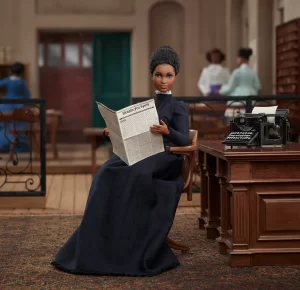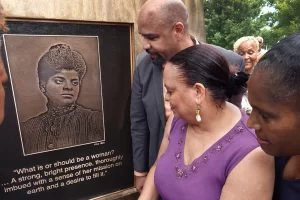Memphis Free Speech
The new Barbie doll of journalist and activist Ida B. Wells.
Jason Tidwell/Mattel
I had a Skipper and a Scooter. I wish I could have had an Ida B. -dayle
Journalist Ida B. Wells is commemorated with a Barbie doll for fearless activism
NPR
by Elizabeth Blair
Educator, journalist, anti-lynching activist and NAACP co-founder Ida B. Wells joins the pantheon of distinguished women honored by Mattel with her own signature Barbie doll. Resplendent in a deep blue, floor-length dress with lace details, the new Ida B. Wells doll also comes with a historically significant accessory: a miniature replica of the Memphis Free Speech, the newspaper where Wells became editor and co-owner in 1889.
Mattel has created numerous Barbie dolls to honor both historic and contemporary heroines in the hopes of inspiring “generations of girls to dream bigger than ever before.” It’s Inspiring Women Series includes dolls dedicated to Maya Angelou, NASA mathematician Katherine Johnson and singer Ella Fitzgerald.
The oldest of eight children, Ida B. Wells was born into slavery in Holly Springs, Miss., in 1862. When she was 16, both of her parents and a younger brother died during the yellow fever epidemic. Wells raised her younger siblings and became a teacher to support her family.
Daniel and Michelle Duster attend the dedication of a monument to their great-grandmother, journalist, educator, and civil rights leader, Ida B. Wells in Chicago last year.
Scott Olson/Getty Images
“I am honored that Barbie has chosen to celebrate my great-grandmother, Ida B. Wells, as part of its Inspiring Women Series,” says Michelle Duster, author, public historian, and great-granddaughter of Ida B. Wells in a statement. “My great-grandmother was a trailblazer, who courageously followed her convictions and challenged the status quo by fighting for civil rights and women’s suffrage. This is an incredible opportunity to shine a light on her truth and enduring legacy to empower a new generation to speak up for what they believe in.”
A pivotal moment in Wells’ life came in 1883 when she was traveling by train from Memphis to Woodstock, Tenn., where she was a teacher. When she refused to give up her seat and ride in a segregated car, she was forcibly removed. Wells later sued the Chesapeake, Ohio and Southwest Railroad Co. A local court ruled in her favor but the decision was eventually overturned in federal court.
Wells became a fierce anti-lynching activist. She investigated white mob violence and wrote scathing indictments of the lynchings of Black men. Her articles so angered locals, the offices of the Memphis Free Speech were destroyed.
In the preface to her 1892 pamphlet Southern Horrors: Lynch Laws In All Its Phases, Wells wrote, “It is with no pleasure I have dipped my hands in the corruption here exposed. Somebody must show that the Afro-American race is more sinned against than sinning, and it seems to have fallen on me to do so.”


Leave a Reply